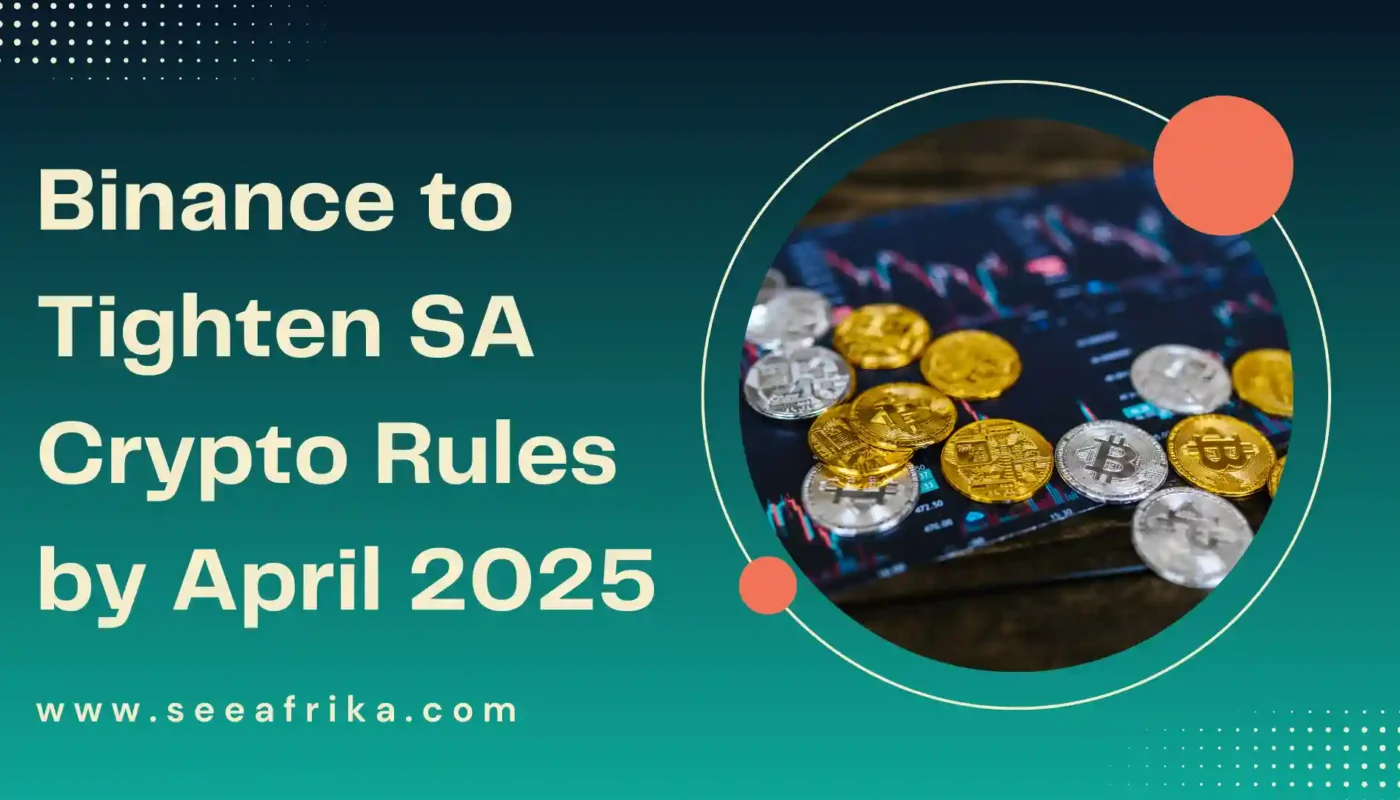Binance, the world’s largest cryptocurrency exchange by trading volume, is set to introduce sweeping changes to its compliance procedures for South African users.
The new SA crypto rules will take effect from April 30, 2025, marking a pivotal moment for crypto regulation in South Africa and signaling broader shifts across the African digital asset landscape.

SA Crypto Rules: What’s Changing for Binance Users?
Starting April 30, 2025, Binance users in South Africa will face stricter requirements when transferring cryptocurrencies. The new SA crypto rules require users to provide detailed information for every deposit and withdrawal.
- For deposits, users must supply the sender’s full name, country of residence, and, if applicable, the originating cryptocurrency exchange.
- For withdrawals, Users must disclose the beneficiary’s full details before the transaction is processed.
These changes apply only to crypto deposits and withdrawals. Trading and other platform features remain unaffected.
Related News:
Why Binance Is Tightening SA Crypto Rules
The move is a direct response to mounting regulatory pressure in South Africa. Local authorities, including the South African Revenue Service (SARS) and the Financial Sector Conduct Authority (FSCA), are ramping up oversight of the crypto sector. SARS now requires all individuals, exchanges, and intermediaries involved in crypto transactions to register with the authority—failure to do so is illegal.
Binance’s new SA crypto rules align with global standards, such as the Financial Action Task Force’s (FATF) ‘Travel Rule,’ which requires exchanges to collect and transmit information about the originators and beneficiaries of crypto transfers.
What Happens If You Don’t Comply?
Binance has made it clear: missing or incomplete information will result in delayed transactions or, in some cases, reversal of funds back to the sender. To facilitate the rollout, all users will need to re-login to their accounts starting April 24, 2025.
A pop-up message will prompt users to enter the required details during affected transactions, ensuring everyone is aware of the new SA Crypto Rules.
South Africa’s Push to Become a Crypto Hub
Africa’s crypto landscape is evolving rapidly. Countries like Nigeria, Kenya, and Mauritius are also developing robust regulatory frameworks for digital assets. South Africa was an early adopter, requiring Crypto Asset Service Providers (CASPs) to obtain licenses and comply with anti-money laundering (AML) regulations.
The continent is experiencing explosive growth in blockchain adoption, driven by financial exclusion, high mobile penetration, and a young, tech-savvy population. In 2025, the African crypto market is projected to reach $2.9 billion in revenue.
South Africa is positioning itself as a leading hub for digital assets in Africa. The country’s strong legal framework and ease of doing business make it an attractive entry point for crypto expansion on the continent. In 2024, the FSCA approved 59 crypto platform licenses, with over 260 applications still under review.
The South African crypto market is projected to generate $278 million in revenue in 2025, with expectations to reach $332.9 million by 2028. This growth is fueled by regulatory momentum and increasing institutional interest.
Key Trends Shaping Africa’s Crypto Future
- Mobile Money & Virtual Assets: Platforms like M-Pesa are expanding financial access, while virtual assets are gaining regulatory clarity.
- Cybersecurity: As adoption grows, so does the focus on protecting users from escalating cyber threats.
- Remittances: Crypto offers cost-effective alternatives for cross-border payments, challenging traditional remittance providers.
- Youth & Innovation: Africa’s young population is driving demand for digital assets and blockchain solutions.
The Road Ahead: Regulation, Trust, and Growth
The introduction of stricter SA crypto rules by Binance is more than a compliance update—it’s a sign of the maturing cryptocurrency ecosystem in South Africa and Africa as a whole. While users may face new hurdles, these rules are designed to enhance security, combat financial crime, and foster greater trust in digital assets.
As South Africa and its neighbors continue to refine their regulatory frameworks, the continent is poised to become a global leader in crypto adoption and innovation. The tightening of SA crypto rules by Binance is just the beginning of Africa’s next chapter in the digital economy.
If you enjoy our content, you’ll love the amazing stories we share on Facebook, Telegram, and Twitter!
Subscribe and follow us for more premium SeeAfrika content.




